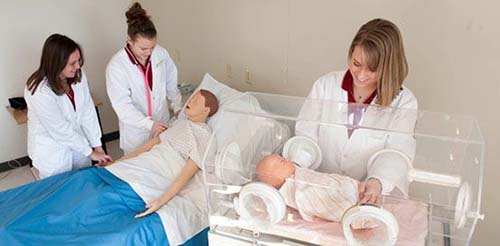
Neonatal Nursing: Providing Vital Infant Care
So you think you want a career in nursing. If you have a soft spot for newborn babies, working as a neonatal nurse may be your dream job. The field of neonatal care has been in existence since the 1960s, but recent advances in technology have made neonatal nursing an exciting and challenging career. Registered Nurses who work with newborns report a high level of job satisfaction.
The field of neonatal nursing
The term “neonatal” refers to an infant’s first 28 days of life. Neonatal nurses work in Level I, II, or III nurseries, providing care to newborns. A Level I nursery is one set up for healthy newborn babies, but this setting is almost obsolete, as healthy babies now tend to share rooms with their mothers and have very short stays in the hospital after birth.
In Level II and Level III nursery settings, neonatal nurses have opportunities for more hands-on care, as well as greater medical challenges.
Level II nurseries function as intermediate or special care units. Usually a baby receiving Level II care is premature or suffering from an illness, and therefore needs more individualized and extended care prior to discharge.

A Level III setting is a neonatal intensive care unit (NICU), providing care to newborns who need more assistance than can be provided at a lower level. Level III babies tend to be more premature, or to suffer from conditions requiring a higher degree of technological assistance or surgery.
Although there are many different types of nurses who work with infants and toddlers, it is the NICU nurse who works with infants during their first month of life.
Over 90% of NICU employees are nurses, so you can see the importance of this profession to the care of vulnerable newborns, for whom medical technology has greatly improved their odds. For example, about 40,000 low-birth weight babies are born each year in the U.S. In recent years their survival rates have grown to where they are now 10 times greater than even 15 years ago.
Neonatal nurse responsibilities

The duties of a neonatal nurse range from basic care to high-technology interventions. Basic care duties include everything from changing diapers and feeding infants to checking temperatures. Luckily, they also include times for holding and cuddling the newborns. Neonatal nurses can also instruct parents in basic infant care.
Neonatal nurses also provide basic and advanced medical assistance. They administer any prescribed medications. If an infant can’t feed normally, they may provide intravenous feeding, or feeding through a gavage tube from nose or mouth to stomach.
They will ensure that the infant receives the right amount of dietary supplement or formula and will monitor to ensure that feeding is uneventful. Neonatal nurses also insert and change IVs, draw blood, and administer blood transfusions.
According to individual hospital protocols, nurses can perform other medical duties as well, depending upon training and experience.
Neonatal nurse qualifications
The requirements for a nurse to practice in a neonatal unit vary by institution. Some units require at least one year relevant nursing experience, while others will hire an RN right after licensure.
Each state requires successful completion of a state board of nursing licensing exam, after completion of a bachelor’s or associate degree in nursing. Basic RN-level training does not include special programs for neonatal nursing, but elective coursework is often available at that level.
Many nurses choose to obtain additional graduate-level training to become a neonatal nurse practitioner.
Neonatal nurses may obtain national certification to demonstrate their specialized knowledge and skills. Neonatal nurses typically receive certification in one or more of the following, depending upon their particular education and experience: Neonatal Intensive Care Nursing, Neonatal Resuscitation Provider, or Neonatal Nurse Practitioner.
Career opportunities
While the recent economic downturn has temporarily reduced nursing shortages in some areas, overall demand is expected to remain high, as continued medical advances maintain the need for experienced neonatal nurses in Level II and III settings.
Salaries for neonatal nurses are quite competitive. Though starting in the upper 50s to mid-60s annually, salaries are higher for experienced nurses, and up to $110,000 or more for neonatal nurse practitioners with advanced training.


